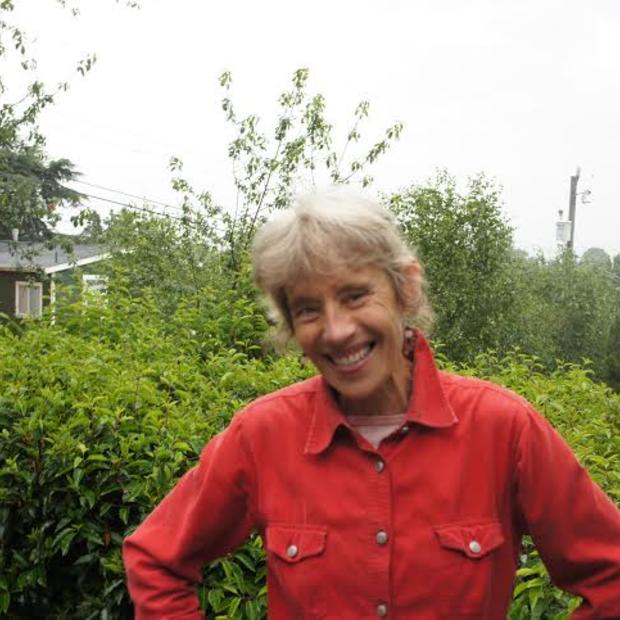For the state’s leading advocacy group for organic and sustainable farming, September is celebrate organic month. What’s the celebration about? And what do growers talk about when they talk “organic”?
Click on the player above or here to listen to the audio version of this story.
Tilth Producers of Washington celebrates organic and sustainable foods, drawing a crowd for cider, wine, and chocolate at Theo’s Chocolate, the first certified organic and fair trade chocolate maker in North America. “We want people to understand the health benefits of organic and also the environmental benefits.” Amy Besunder, executive director of TIlth Producers. ”We’re hoping that people will understand that making the choice to purchase organic affects their community in a way that is incredibly positive.”
Theo Chocolate co-founder Joe Whinney says organic is a baseline: “The organic system is more about how a product is produced. It’s not a promise of what’s inside it.” Contributing to the planet’s overall environmental health is the most important, says Whinney. When he worked with indigenous Mayan cocoa farmers he fell in love with the cocoa bean, the tree and the crop. “I mean it’s magical. It’s a gorgeous, delicious, wonderful thing. I saw that social and environmental degradation were really business issues. So I thought if I could build a business that respected all life that the planet and the people would be better off.” Theo’s Chocolate works directly with farmers in the humid, tropical countries where cocoa grows — Ecuador, Costa Rica, The Republic of Congo.
He pays farmers $3,000 to $4,000 a year for premium beans, 10 times what the average cocoa farmer earns. “These are some of the most important and most sensitive environmental places on the planet. So when you have a tree, a crop that can be used to build biodiversity, it’s not only better for the tree, provides food and other cash crops for farmers but benefits all of us environmentally.”
But what does organic mean to a farmer close to home? Come to Blue Heron Farm in the Skagit Valley. There’s chickens here for the family and garlic, chard, broccoli, carrots, tomatoes and berries for market farming. Anne Schwartz has farmed this land with its top soil of Puyallup silt loam, and an under layer of sand, for more than 30 years.
She’s built it up with organic matter, crop rotation, and cover crops from harvest to harvest. “As an organic farmer I am cultivating the land. I have to repair the damage I’ve done by tearing it open in the first place. Vegetable production is very intensive. I actually like to say that livestock production based on grass is probably the most sustainable agriculture we have.” We hop out of her truck to take a look at a greenhouse where tomato vines grow as high as trees, some 10 feet tall. ”This is a sun god and it just wants to keep growing.” Schwartz grows six varieties of tomatoes.
Blue Heron Farm sells to Klesak Family Farms, the North Cascades Environmental Learning Center, and several CSA or community supported agriculture customers. Organic farming has been a way of life since she joined Tilth Producers in 1979. After receiving a degree from WSU, she began promoting organic small grain production in the Palouse in central Washington. Soil erosion from mono-culture farming — 50 to 80 tons per acre — was epidemic. “Earl Butz, the secretary of Agriculture at the time, was saying, pull out the fence rows and get rid of the hedges and, you know, just plow it all up and plant it.”
Then Schwartz came to the Skagit Valley and met Gene Kahn, the founder of Cascadian Farms, who moved organic into the mainstream. “It’s become a career that you’re never done learning. Whether its crop protection or how to deal with which bugs or who’s controlling what we see on the grocery shelves.” We walk through fields of recently harvest carrots, cauliflower and cabbage. Floods in the spring have caused a downy mildew problem in the cabbage. Three of the last five years have seen the Skagit River overflow its banks. Nematodes, a microscopic soil worm, are also a problem. With help from WSU researchers, Schwartz discovered a solution, high sulfur mustard to change soil dynamics. “I did a mustard rotation there for a couple of years and followed it with blueberries.” WSU is designing a multiyear study using blended mustard seed meal on one of Schwartz’s fields.
It’s time to load produce from the cooler to bring to Tilth Producers first annual gala. Yellow zucchini, spicy arugula, Italian parsley, corn, and flats of tomatoes are squeezed in. “It’s what I can fit in this little car.” After the gala, it’s back to work; fall crops need to be planted and new seed varieties selected that can withstand climate change. Like Joe Whinney with Theo’s Chocolate, Schwartz's sustainable organic farming is a non-stop activity — nourishing and protecting the land and educating and supporting consumers and other farmers for generations to come..
Green Acre Radio is supported by the Human Links Foundation. Engineering by CJ Lazenby. Produced through the Jack Straw Foundation and KBCS.



